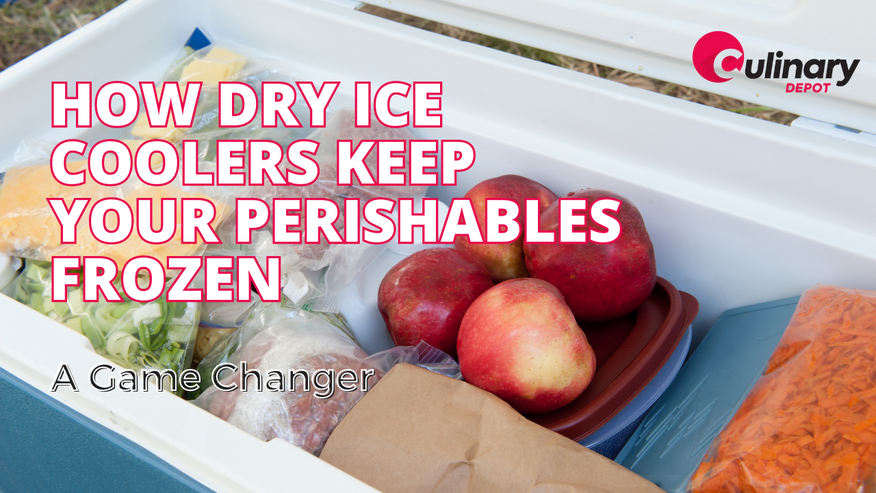Aug 16th 2023 - Team Member
How Dry Ice Coolers Keep Your Perishables Frozen: A Game Changer in Commercial Kitchens
As culinary professionals in commercial kitchen settings, you understand the importance of preserving the freshness of perishable items, especially during transport. One innovative solution is the dry ice cooler, a tool changing how the industry handles perishable items. Let's dive into how it works.
Dry Ice: A Brief Overview
Before discussing the benefits of dry ice coolers, we need to understand what dry ice is and its safety considerations.
The Science Behind Dry Ice

Dry ice, the solid form of carbon dioxide, sublimates or turns directly into gas at an extremely cold -78.5 degrees Celsius (-109.3 degrees Fahrenheit). This extreme cold makes it ideal for preserving perishables.
Safety Guidelines for Handling Dry Ice
Despite its benefits, dry ice requires careful handling due to its extreme cold, which can cause frostbite. Always use protective gloves or tools, and ensure that storage areas are well-ventilated to prevent the build-up of carbon dioxide gas.
How Dry Ice Coolers Work
The effectiveness of dry ice coolers is rooted in the properties of dry ice and the design of the cooler.
Sublimation: Dry Ice's Secret Weapon

In a dry ice cooler, the dry ice absorbs heat from the perishable items, effectively freezing them. It leaves no residue, a significant advantage over regular ice, which can create a watery mess as it melts.
The Role of the Cooler
The cooler's design is crucial in prolonging the life of dry ice. The better the cooler's insulation, the slower the sublimation process, making the dry ice last longer.
The Legalities Surrounding Dry Ice
Dry ice regulations may differ based on location and quantity, and it's essential to know these when using dry ice in a commercial setting.
Transporting Dry Ice
Transportation of dry ice, especially via air, is governed by specific rules due to the risk associated with the release of carbon dioxide gas.
Weighing the Pros and Cons of Dry Ice Coolers
Dry ice coolers come with their advantages and disadvantages, which you must consider before implementing them in your commercial kitchen.
Advantages of Dry Ice Coolers

The primary benefits of dry ice coolers are their ability to maintain very low temperatures for extended periods and their no-residue property, eliminating the typical mess associated with melted ice.
Disadvantages of Dry Ice Coolers
Despite these benefits, dry ice coolers require careful handling due to extreme cold. The cost of dry ice and its tendency to evaporate over time are other considerations.
Dry ice coolers are an efficient method to keep perishables frozen, but it's crucial to follow safety procedures, abide by regulations, and weigh the pros and cons. With the right precautions, they can be an invaluable tool in preserving and transporting perishables in commercial kitchen settings.
Wrapping It Up

Navigating the world of perishable goods preservation in a commercial kitchen setting can be challenging. However, dry ice coolers offer a valuable solution to keep food items frozen, eliminating many of the inconveniences of traditional methods.
Their ability to maintain low temperatures for extended periods, along with leaving no residual mess, provides an attractive option for those willing to handle and store them safely. But remember, as with any tool, careful consideration of the associated costs and adherence to transport regulations is crucial.

